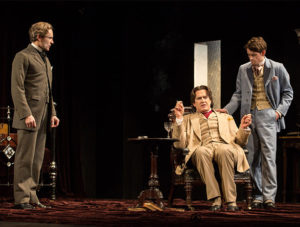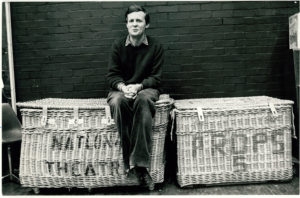 “There is only one thing that can kill the Movies, and that is education.”
“There is only one thing that can kill the Movies, and that is education.”
Will Rogers, The Autobiography of Will Rogers
Terry Teachout on the arts in New York City
 John Raitt sings “Soliloquy,” from Carousel, on General Foods 25th Anniversary Show: A Salute to Rodgers and Hammerstein, originally telecast on March 28, 1954, by ABC, CBS, NBC, and DuMont. Raitt created the role of Billy Bigelow in the show’s original Broadway production:
John Raitt sings “Soliloquy,” from Carousel, on General Foods 25th Anniversary Show: A Salute to Rodgers and Hammerstein, originally telecast on March 28, 1954, by ABC, CBS, NBC, and DuMont. Raitt created the role of Billy Bigelow in the show’s original Broadway production:
(This is the latest in a series of arts-related videos that appear in this space each Monday, Wednesday, and Friday)
In today’s Wall Street Journal I review the Brooklyn transfer of David Hare’s The Judas Kiss, starring Rupert Everett as Oscar Wilde. Here’s an excerpt.
* * *
David Hare would seem a near-ideal playwright to retell Oscar Wilde’s sad, sordid tale, for it is his special genius to steer clear of one-sided characterizations. Just as Mr. Hare almost always gives the (usually conservative) devil his due in his political plays, so does he leave the viewer of “The Judas Kiss,” his 1998 play about Wilde and Bosie Douglas, the playwright’s young lover, in no doubt of Wilde’s own culpability in his fall from grace. Yet the original production of “The Judas Kiss” flopped in London’s West End and on Broadway, and though it was thought at the time that Mr. Neeson, who created the role, was miscast, most critics also felt that the script itself came up short.
 So why is it now playing at Brooklyn’s BAM Harvey Theater? Because the successful 2012 London revival, of which this production is a belated transfer, starred Rupert Everett, who was universally regarded as ideal for the part. And so he is: Mr. Everett’s performance is a creative impersonation of breathtaking authority, one that flirts with exaggeration but never crosses the line into caricature….
So why is it now playing at Brooklyn’s BAM Harvey Theater? Because the successful 2012 London revival, of which this production is a belated transfer, starred Rupert Everett, who was universally regarded as ideal for the part. And so he is: Mr. Everett’s performance is a creative impersonation of breathtaking authority, one that flirts with exaggeration but never crosses the line into caricature….
Only one thing is missing from both play and portrayal. Mr. Hare has spoken of how Wilde “identified completely with Christ,” and Mr. Everett calls him “a kind of Christ figure.” This strikes me as coming it several miles too high, and it points to one of the failings of “The Judas Kiss,” which is that Mr. Hare, much to my surprise, has idealized Wilde’s personality….
More important, “The Judas Kiss” is dramaturgically unbalanced. The first act, in which Wilde is seen deliberately choosing not to run from the police who are en route to the louche hotel where he awaits his appointment with fate, is a textbook exercise in the accumulation of tension, and Neil Armfield, the director, turns the screw with delicious stealth, even daring to put a ticking clock on the wall. But the second act, which shows us Wilde in impoverished exile, unwinds all the anxiety and replaces it with a too-protracted arc of steadily accumulating gloom. Believable? Yes. Involving? Not entirely…
Even more disappointing are the one-note performances of the actors cast in the key supporting roles….
* * *
Read the whole thing here.
The trailer for the Toronto transfer of The Judas Kiss:
 “Unfortunately for the modern dramatist, during the past century and a half the public realm has been less and less of a realm where human deeds are done, and more and more of a realm of mere human behavior. The contemporary dramatist has lost his natural subject.”
“Unfortunately for the modern dramatist, during the past century and a half the public realm has been less and less of a realm where human deeds are done, and more and more of a realm of mere human behavior. The contemporary dramatist has lost his natural subject.”
W.H. Auden, “Genius & Apostle” (from The Dyer’s Hand)
In today’s Wall Street Journal “Sightings” column I sift through The Blue Touch Paper, David Hare’s recently published memoir, for clues to his distinctive approach to political theater. Here’s an excerpt.
* * *
David Hare is back—though not on Broadway. “The Judas Kiss,” his 1998 play about the travails of Oscar Wilde, is being revived at Brooklyn’s BAM Harvey Theater in a West End transfer starring Rupert Everett that seems likely to be, at the very least, a succès d’estime, if only because the Obama administration’s ukase on transgender bathrooms in public schools has just rung the media bell. No doubt Mr. Hare is thrilled by the coincidence, since he’s a political artist through and through. Witness “The Blue Touch Paper,” his recently published memoir, in which he declares himself to have been a playwright who “was always happiest when I had a cause.”
 Outside of a pair of favorable notices in the New York Times, “The Blue Touch Paper” received only modest attention when it came out in the U.S. in November. That stands to reason: Mr. Hare isn’t nearly as well known over here as he is in England. Several of his plays, most notably “The Judas Kiss,” “Plenty,” “Skylight” and “The Vertical Hour,” have been staged on Broadway, but none has been a hit. Yet his place in the annals of postwar drama is both secure and well deserved, not least because he is that rarity of rarities, a political playwright who is also a first-class artist.
Outside of a pair of favorable notices in the New York Times, “The Blue Touch Paper” received only modest attention when it came out in the U.S. in November. That stands to reason: Mr. Hare isn’t nearly as well known over here as he is in England. Several of his plays, most notably “The Judas Kiss,” “Plenty,” “Skylight” and “The Vertical Hour,” have been staged on Broadway, but none has been a hit. Yet his place in the annals of postwar drama is both secure and well deserved, not least because he is that rarity of rarities, a political playwright who is also a first-class artist.
To be sure, Mr. Hare occasionally lets his passions override his artistic judgment, as he did in 2006 with “Stuff Happens,” a coarse, smug documentary play about the Gulf War that shed no light on its subject. Far more often than not, though, he writes plays of ideas in which—like George Bernard Shaw, his eminent predecessor—he creates “villains” who are fully rounded creatures of flesh and blood….
“Using the theatre either to lecture or to parade your virtuous beliefs excludes the audience and leaves them with nothing to do,” he writes. “They hate you for it, because it insults their intelligence. Worse, it insults their experience of life. A good play is there not to close minds but to open them.”
Makes sense, right? Of course—to people who look to art to show them the world as it is. But to those for whom a play is not a potentially persuasive study of human character but a blunt instrument, Mr. Hare’s commonsense approach is anathema….
* * *
Read the whole thing here.
Laura Rook and Philip Earl Johnson in a scene from the Court Theatre’s 2013 Chicago revival of Skylight, directed by William Brown:
Here’s my list of recommended Broadway, off-Broadway, and out-of-town shows, updated weekly. In all cases, I gave these shows favorable reviews (if sometimes qualifiedly so) in The Wall Street Journal when they opened. For more information, click on the title.
BROADWAY:
• An American in Paris (musical, G, too complex for small children, reviewed here)
• The Color Purple (musical, PG-13, some performances sold out last week, reviewed here)
• Eclipsed (drama, PG-13, Broadway remounting of off-Broadway production, closes June 19, original production reviewed here)
• Fully Committed (comedy, PG-13, closes July 24, reviewed here)
• Fun Home (serious musical, PG-13, some performances sold out last week, reviewed here)
• Hamilton (musical, PG-13, Broadway transfer of off-Broadway production, all performances sold out last week, reviewed here)
• The King and I (musical, G, perfect for children with well-developed attention spans, reviewed here)
• Matilda (musical, G, closing Jan. 1, reviewed here)
• Les Misérables (musical, G, too long and complicated for young children, closes Sept. 4, reviewed here)
• On Your Feet! (jukebox musical, G, reviewed here)
• She Loves Me (musical, G, suitable for bright children capable of enjoying a love story, many performances sold out last week, closes July 10, reviewed here)
OFF BROADWAY:
• The Fantasticks (musical, G, suitable for children capable of enjoying a love story, reviewed here)
 IN BALTIMORE:
IN BALTIMORE:
• Death of a Salesman (drama, PG-13, closes June 12, reviewed here)
• A Streetcar Named Desire (drama, PG-13, closes June 12, reviewed here)
CLOSING SOON IN CHICAGO:
• Mary Page Marlowe (drama, PG-13, closes June 5, reviewed here)
An ArtsJournal Blog